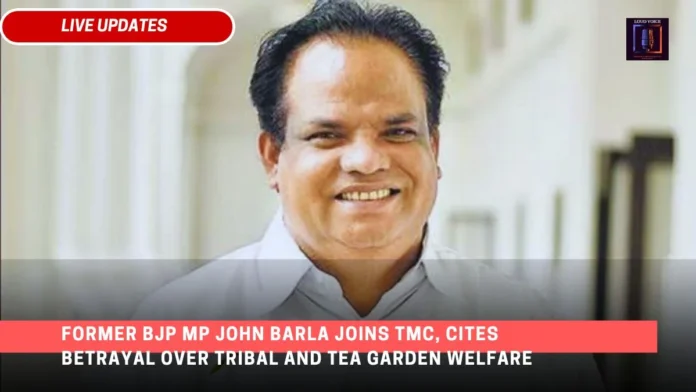Key Takeaways
- Former BJP MP John Barla joins TMC after saying the BJP blocked his efforts to better the plight of tribal tribes and tea garden workers.
- Barla, once Union Minister of State for Minority Affairs, was denied a ticket in the 2024 elections, deepening his rift with the BJP.
- His action is anticipated to increase the TMC’s support in Alipurduar, an area that mostly depends on tribal votes and tea estates.
- The shift comes amid claims that key development projects, including a ₹160 crore hospital, were sabotaged internally by BJP leadership.
- Barla’s defection may signal wider unrest within the BJP’s Bengal unit and impact its future regional performance.
A Dramatic Political Turn
Former Union Minister and BJP MP John Barla formally joined the Trinamool Congress (TMC) on Thursday, a political turnabout that has caused tremors in the tribal and tea garden districts of West Bengal. His defection didn’t come as a complete surprise, but the reasons he laid out were explosive: Barla accused the BJP leadership of deliberately blocking his efforts to serve the very people who elected him—tribal communities and tea garden workers.
Barla’s decision to jump ship just months after being denied a BJP ticket for the 2024 general elections underscores deeper cracks within the party’s Bengal unit. Once considered the saffron party’s rising tribal face in North Bengal, Barla now stands with Mamata Banerjee’s TMC, vowing to “actually work for the people.”
Who is John Barla? From Tea Worker’s Son to Parliamentarian
Born into a humble tribal family in the Alipurduars region, Barla’s journey is emblematic of grassroots politics. He fought for the rights of tea garden workers, one of India’s most marginalized communities, at the start of his political career. Elected to the Lok Sabha in 2019 from Alipurduars, Barla was appointed Minister of State for Minority Affairs. His appointment was seen as the BJP’s attempt to consolidate tribal and tea estate votes in North Bengal.
But the honeymoon didn’t last.
Blocked Projects and Broken Promises: Barla’s Explosive Allegations
Barla revealed that he had drawn up plans for a ₹160 crore super-speciality hospital to serve the tribal and tea garden populations in Alipurduars. “We had even finalized land for the hospital. The only step left was to sign the MoU,” he said. But that never happened.
According to Barla, BJP leaders—including Suvendu Adhikari, now the Leader of the Opposition in West Bengal—played a direct role in halting the project. “A call went from here to Delhi, and the project was shelved,” he claimed.
For many, this episode has become symbolic of the BJP’s alleged disconnect with the grassroots needs of the very communities it claims to represent.
Tea Garden Workers and Tribal Voters: A Key Political Demographic
Alipurduars is no ordinary constituency. With a dense population of tribal people and tea garden workers, it’s a region where emotion, identity, and development are deeply interlinked. Historically neglected, these communities have often been used as vote banks but rarely empowered.
Barla’s alignment with the TMC is likely to shift this dynamic.
The government of Mamata Banerjee has long made an effort to portray itself as an advocate for underprivileged groups. By bringing in Barla—who has lived the life of the people he represents—TMC strengthens its credibility in the region.
Internal Power Struggles: A Window into BJP’s Bengal Troubles
Barla’s strained relations with BJP legislative chief whip Manoj Tigga were no secret. After the party denied Barla a ticket for the 2024 elections and fielded Tigga instead, who went on to win, Barla began distancing himself from the BJP’s Bengal unit. Insiders suggest their rivalry also affected the BJP’s performance in the 2023 Madarihat assembly bypoll, which the TMC comfortably won.
“Tea garden workers and tribal people blessed the BJP. But what did they get in return?” Barla questioned, hinting at a growing disenchantment among core BJP voters.
TMC’s Response: A Strategic Move to Deepen Grassroots Reach
At the formal induction event in Kolkata, TMC leaders Subrata Bakshi and Aroop Biswas welcomed Barla into the party fold. A post on the party’s official X (formerly Twitter) account hailed Barla’s “experience and grassroots connect” as vital assets.
“For us, it’s not about gaining a former minister. It’s about gaining a man of the people,” said a senior TMC leader, adding that Barla would help the party “strengthen the fight for people’s rights” in North Bengal.
A History of Controversy: Barla’s Call for a Separate Union Territory
This isn’t the first time John Barla has stirred political waters. In 2021–22, he and a few BJP legislators demanded the creation of a Union Territory out of North Bengal’s districts. The move was widely condemned, especially by the TMC, which accused the BJP of trying to divide the state.
Though controversial, the episode reinforced Barla’s image as a politician unafraid to speak out—even against his own party.
The Bigger Picture: What Barla’s Move Signals for 2024 and Beyond
Barla’s switch to TMC ahead of the 2024 elections has significant implications. Not only does it expose the fault lines within the BJP’s state machinery, but it also strengthens TMC’s claim to being a party that genuinely champions grassroots voices.
This realignment may further dent BJP’s appeal in North Bengal—a region where it once held a solid presence. With Barla’s credibility among tribal and tea garden voters, the TMC could reclaim lost ground and energize its local cadre.
Conclusion
John Barla’s political migration from BJP to TMC is more than just another defection—it’s a reflection of simmering tensions, thwarted development dreams, and a desire to return to grassroots governance. His move might just be the catalyst for a larger shift in North Bengal’s political loyalties. As West Bengal inches closer to another high-stakes election, the tribal and tea worker narrative could very well tip the scales—and John Barla might be the unexpected protagonist leading that change.


